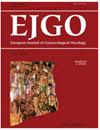Interaction of Pten gene and AKT/mTOR pathway in endometrial adenocarcinoma proliferation
IF 0.5
4区 医学
Q4 OBSTETRICS & GYNECOLOGY
引用次数: 0
Abstract
Objective : The Pten/AKT/mTOR pathway is one of the most critical pathways in tumor proliferation. The present research aimed to analyze the interaction between Pten gene and AKT/mTOR pathway in endometrial cancer cell lines. Methods : TCGA analysis was used to study the relationship between Pten expression and survival of endometrial cancer patients. Human endometrial cancer cell lines with low Pten expression (Ishikawa) and with high Pten expression (HEC-1-A) were selected. Plasmid transfection was used to regulate the Pten expression in the cell lines. QRT-PCR and Western Blot were adopted to detect Pten/AKT/mTOR expressions in tumor cells. Western blot of Ki-67 and CCK-8 were adopted to detect the activity of cells proliferation. A p < 0.05 was considered to be statistically significant. Results : The TCGA analysis showed the Pten expression was associated with survival of endometrial cancer patients significantly. Plasmid transfections elevated Pten expression in Ishikawa and decreased Pten expression in HEC-1-A cells. After the plasmid transfection, with overexpression of Pten in Ishikawa cell line, the Western Blot and QRT-PCR revealed the AKT/mTOR pathway is restrained, leading to decreased cell proliferation; with Pten decreased in HEC-1-A cells, the AKT/mTOR pathway is activated, leading to increased cell proliferation. Conclusions : A decreased expression of Pten gene in Ishikawa and HEC-1-A cell lines could activate AKT/mTOR pathway and promote tumor cells proliferation.Pten基因与AKT/mTOR通路在子宫内膜腺癌增殖中的相互作用
目的:Pten/AKT/mTOR通路是肿瘤增殖过程中最关键的通路之一。本研究旨在分析子宫内膜癌症细胞系中Pten基因与AKT/mTOR通路的相互作用。方法:采用TCGA分析方法,研究子宫内膜癌症患者Pten表达与生存的关系。选择具有低Pten表达的人子宫内膜癌症细胞系(Ishikawa)和具有高Pten表达(HEC-1-A)。质粒转染用于调节细胞系中Pten的表达。采用QRT-PCR和Western Blot检测肿瘤细胞中Pten/AKT/mTOR的表达。采用Ki-67和CCK-8蛋白印迹法检测细胞增殖活性。p<0.05被认为具有统计学意义。结果:TCGA分析显示,Pten的表达与子宫内膜癌症患者的生存率显著相关。质粒转染提高了Ishikawa细胞中Pten的表达,降低了HEC-1-A细胞中Ptn的表达。质粒转染后,随着Pten在Ishikawa细胞系中的过表达,Western Blot和QRT-PCR显示AKT/mTOR途径受到抑制,导致细胞增殖减少;随着Pten减少,HEC-1-A细胞中的AKT/mTOR途径被激活,导致细胞增生增加。结论:Pten基因在Ishikawa和HEC-1-A细胞系中的表达降低可激活AKT/mTOR通路,促进肿瘤细胞增殖。
本文章由计算机程序翻译,如有差异,请以英文原文为准。
求助全文
约1分钟内获得全文
求助全文
来源期刊
自引率
25.00%
发文量
58
审稿时长
1 months
期刊介绍:
EJGO is dedicated to publishing editorial articles in the Distinguished Expert Series and original research papers, case reports, letters to the Editor, book reviews, and newsletters. The Journal was founded in 1980 the second gynaecologic oncology hyperspecialization Journal in the world. Its aim is the diffusion of scientific, clinical and practical progress, and knowledge in female neoplastic diseases in an interdisciplinary approach among gynaecologists, oncologists, radiotherapists, surgeons, chemotherapists, pathologists, epidemiologists, and so on.

 求助内容:
求助内容: 应助结果提醒方式:
应助结果提醒方式:


